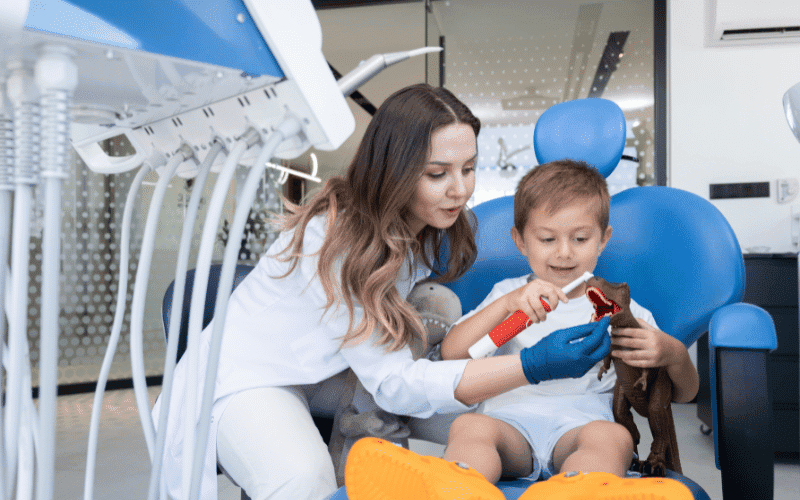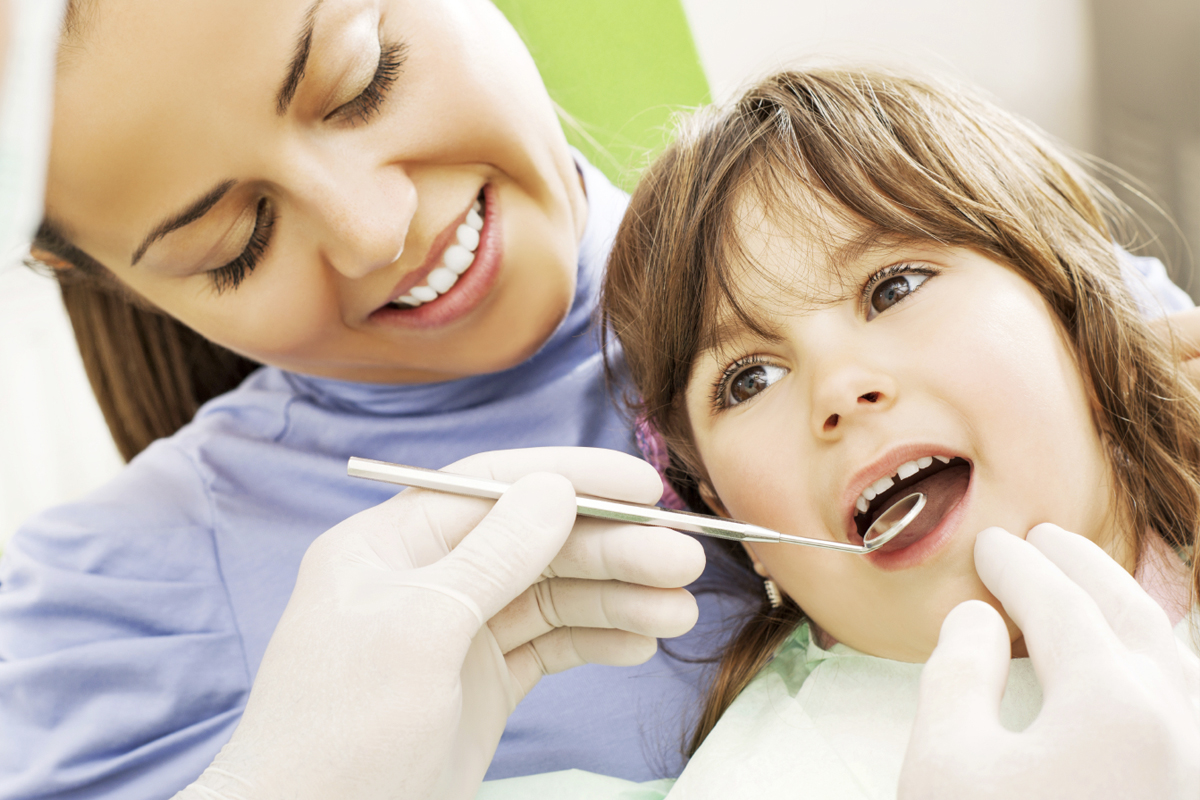Spokane Valley:
(509) 228-3834

How Pediatric Dentists Make Dental Visits Fun and Stress-Free for Kids?
Dental visits can often be daunting for kids. The unfamiliar environment, strange tools, and new faces can create anxiety. Pediatric dentists specialize in transforming these experiences into enjoyable and stress-free events. They employ various strategies to ensure that dental care is not just a routine but a positive experience. Their goal is to create a welcoming atmosphere where children feel safe and confident about their dental health.
Understanding Pediatric Dentistry
The dental care of children from birth through puberty is the main emphasis of pediatric dentistry. It involves unique training and techniques tailored specifically for younger patients.
Unlike general dentistry, a pediatric dentist is specialized in handling children’s dental needs and behavior. They receive additional education on child psychology, growth, and development. This training equips them to manage children’s fears and establish a positive dental experience.
These dentists work to prevent and treat dental issues specific to children. They are adept at reducing the anxiety associated with dental visits and are aware of the difficulties involved in caring for young patients.
They use techniques and tools designed to be more comfortable for children, making them a crucial part of a child’s overall health and well-being. Their knowledge guarantees that kids get the right care in a nurturing setting.
Different Ways Pediatric Dentists Turn Dental Visits into Fun
Creating a Kid-Friendly Environment
Office Design and Atmosphere: Pediatric dental offices are designed to be vibrant and inviting. Bright colors and fun themes transform a typical dental setting into an exciting environment for kids.
Themes might include undersea adventures, outer space, or jungle safaris, making the office feel more like a playground than a clinical space. Child-friendly decorations, such as wall murals and interactive displays, capture children’s imaginations and help ease their anxiety.
Entertainment Options: TVs playing popular cartoons are a common feature in pediatric dentist clinics to keep kids occupied and interested. These visual distractions help shift children’s focus away from any apprehension they might feel.
Additionally, play areas with toys and interactive games provide an engaging way for kids to pass the time before their appointment. These entertainment options are not just for fun. They also help in reducing pre-visit anxiety and make the waiting period more pleasant.
Welcoming Staff: The dental team’s attitude is very important in fostering a good experience. Pediatric dentists are taught to be amiable, personable, and comforting. As is their staff. They use gentle, encouraging language and a warm, inviting manner to make children feel comfortable.
The staff often wear colorful scrubs and use cheerful tones to make interactions less intimidating and more engaging for young patients.
Communication Techniques
Using Child-Friendly Language: These dentists excel at translating complex dental procedures into simple, understandable terms for children. They explain what will happen using language that is age-appropriate, often employing analogies or stories to make the process less daunting. For example, they might compare a dental cleaning to “tickling” the teeth to make it sound less scary.
Positive Reinforcement: Building confidence and trust is essential in pediatric dentistry. Dentists use reward systems to encourage good behavior and create a positive association with dental visits. This could include stickers, small toys, or even verbal praise. Recognizing and celebrating each child’s cooperation helps reinforce a positive attitude toward dental care.
Gentle and Non-Threatening Procedures
Techniques for Minimizing Discomfort: Pediatric dentists are professionals in using techniques that minimize discomfort. For instance, they might use specialized tools that are quieter and less invasive.
In some cases, they offer sedation options, such as nitrous oxide (laughing gas), to help children relax and remain calm during more involved procedures. These methods ensure that children experience as little pain or discomfort as possible.
Pain Management: Effective pain management is crucial in making dental visits stress-free. Pediatric dentists use numbing gels and localized anesthetics to reduce pain during procedures. These methods help in making dental work less frightening and more tolerable for children.
By addressing pain proactively, dentists ensure that kids are comfortable and less likely to develop a fear of dental visits.
Engaging and Educating Kids
Fun Educational Tools: Pediatric dentists use a variety of educational tools to teach kids about dental hygiene in a fun way. This includes toys shaped like teeth or brushes, colorful storybooks about oral health, and visual aids like diagrams and videos.
These tools make learning about brushing and flossing engaging, helping children understand the importance of dental care in a way that resonates with them.
Interactive Demonstrations: Hands-on activities are another effective method for engaging children. Pediatric dentists might use interactive demonstrations to show how dental tools work or to explain what happens during a visit. This could include letting children explore a model of teeth or practice brushing techniques on a toy.
These activities make learning about dental health interactive and enjoyable, reducing anxiety by making the procedures seem familiar and manageable.
Preparing Kids for Their Visit
Pre-Visit Preparations: Preparing children for their dental visits is key to reducing anxiety. Pediatric dentists often provide information in advance about what to expect, using simple explanations and reassuring language.
They might offer virtual tours of the office or show videos to familiarize children with the environment and procedures. This preparation helps children feel more in control and less nervous about their appointments.
Parental Involvement: Parents play a vital role in preparing their children for dental visits. Pediatric dentists often offer advice on how to talk about upcoming appointments in a positive way.
Encouraging children to view dental visits as a routine and even fun part of their health care can help set a positive tone. Parents can also reinforce good oral hygiene practices at home, which helps children feel more prepared and less anxious about their visits.
Building a Positive Experience
Follow-Up and Feedback: Follow-up visits are important for reinforcing positive experiences. Pediatric dentists often check in with both children and parents to discuss any concerns and celebrate progress. Regular follow-ups help maintain a positive relationship with dental care and provide opportunities to address any issues early on.
Celebrating Successes: Celebrating small victories, such as a successful visit or improved dental hygiene habits, is a great way to build a positive attitude toward dental care. Pediatric dentists might use rewards like stickers or small toys, and acknowledge children’s achievements with praise. These celebrations help children feel valued and encourage them to look forward to their next visit.
Parental Guidance and Support
Preparing Your Child for a Dental Visit: It is essential to prepare your child for their dental visit. Use simple language to explain what will happen and emphasize the positive aspects of the visit. Avoiding negative words or descriptions can help prevent fear.
Tips for Maintaining a Positive Attitude: Maintain a positive attitude about dental care. Your enthusiasm and reassurance will help your child feel more comfortable. Share positive experiences from your own dental visits and encourage good oral hygiene practices at home.
Pediatric dentists use a variety of methods to make dental visits enjoyable and stress-free for children. From creating a welcoming environment to using gentle techniques and educational tools, they focus on making each visit a positive experience. Parents are encouraged to seek pediatric dental care to ensure their children have a healthy and happy relationship with dental health.





